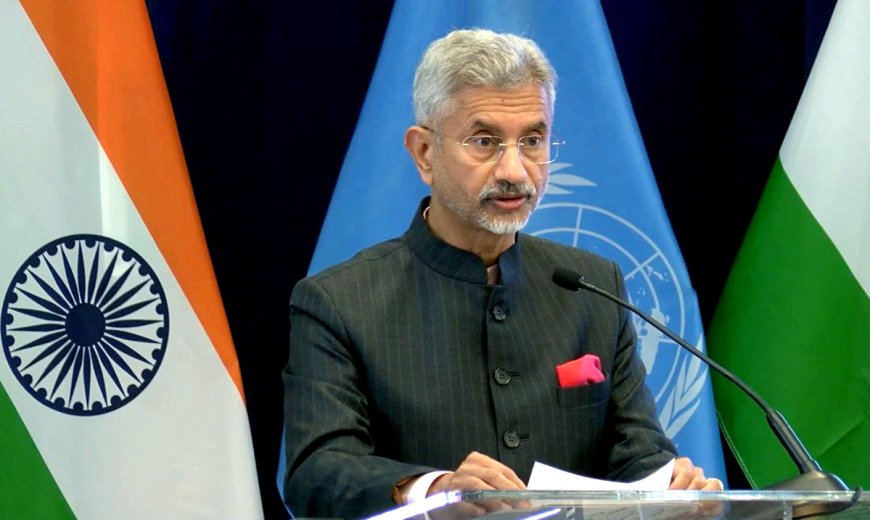“India Will Not Be Intimidated”: Jaishankar Rebukes Nuclear Blackmail Amid Rising Global Tensions
External Affairs Minister S. Jaishankar rejects nuclear threats as a tool of diplomacy, sending a strong message on India's sovereign stance amid regional and global tensions.

New Delhi: A Bold Diplomatic Message from India’s Top Diplomat
In a striking affirmation of India's strategic independence, External Affairs Minister Dr. S. Jaishankar on Monday publicly rebuffed the notion of nuclear blackmail—a term often associated with coercive threats by nuclear-armed states. His remarks, made during an interactive session with policy experts in New Delhi, are being widely interpreted as a direct response to recent rhetorical escalations from Pakistan and veiled Western criticisms, including former U.S. President Donald Trump’s controversial comments.
“India is a responsible nuclear power. We do not use our nuclear capabilities as a bargaining chip. And we will certainly not be intimidated by those who do,” said Jaishankar, as reported by The Times of India.
This marks a rare moment in India’s diplomatic dialogue where the nuclear doctrine is brought to the forefront—not to provoke, but to assert India’s resolve against intimidation.
Context: Who Was Jaishankar Responding To?
Though Jaishankar didn’t name any country directly, his remarks appear to be a rebuttal to Pakistan’s National Security Advisor Moeed Yusuf, who earlier in June made provocative statements suggesting that “nuclear capabilities must be taken seriously by India.” Additionally, Donald Trump, while addressing a conservative think tank in Washington D.C., reportedly claimed that countries like Iran and North Korea “learned from India and Pakistan” on how to leverage nuclear posturing.
India’s refusal to engage in “nuclear brinkmanship” reinforces its commitment to no first use (NFU) policy while simultaneously defending its strategic sovereignty.
What Jaishankar’s Statement Means for India’s Foreign Policy
India’s foreign policy under Prime Minister Narendra Modi has pivoted towards strategic autonomy—avoiding alignments while engaging deeply with all major powers. Jaishankar’s comments reflect this tightrope walk, signaling that India will not be coerced, regardless of who is applying pressure.
“In a world marked by renewed geopolitical tension, India is not a soft state. We will pursue diplomacy from a position of strength, not fear,” he added during the panel at the Observer Research Foundation, a leading policy think tank.
This doctrine of “resilient multilateralism”—a phrase coined by Jaishankar in previous forums—has been a central theme in India’s recent foreign engagements, including its G20 presidency and Quad alliance talks.
Reaction from Strategic Analysts and Allies
Strategic experts have largely welcomed Jaishankar’s remarks as timely and bold. Dr. Brahma Chellaney, professor of strategic studies at the Centre for Policy Research, noted,
“This is a reaffirmation that India’s nuclear posture is defensive, but its diplomacy is not passive. It’s a clear warning to powers attempting psychological coercion.”
U.S.-based policy journal Foreign Affairs recently published a report cautioning that global nuclear posturing is becoming increasingly normalized among smaller powers. In this environment, India's restraint stands out.
Moreover, India’s allies, including France and Japan, have expressed support for India's defensive posture. The French Ministry for Europe and Foreign Affairs, in a joint statement last week, reiterated that “India’s commitment to nuclear responsibility contributes to regional stability.”
The Domestic Political Angle
Jaishankar’s statement is also likely to resonate strongly with the domestic audience. With state elections in Maharashtra and Bihar approaching in early 2026, strong nationalistic postures tend to boost voter confidence in the central government’s leadership. Political analysts believe such assertions of independence align with public sentiment demanding a tougher stance on security issues.
However, opposition parties have criticized the timing, accusing the government of deflecting attention from internal economic issues by fueling external threats. Congress MP Shashi Tharoor tweeted,
“Diplomacy must be firm, but consistent. Statements must not be aimed at a domestic audience when global stakes are involved.”
Why This Matters Now
The world is witnessing rising nuclear tensions—from Russia’s threats over Ukraine to North Korea’s missile tests. In this fragile environment, Jaishankar’s unequivocal rejection of “nuclear blackmail” is both reassuring and assertive.
India’s principled approach also strengthens its position in global forums like the UN Security Council, where New Delhi continues to advocate for non-proliferation and disarmament. It aligns with its long-standing demand for reforms in global governance structures.
Conclusion: Assertiveness Without Aggression
Jaishankar’s comments reflect a mature, calculated shift in Indian diplomacy—strength without provocation. It’s a reminder to the world that India may be a peaceful power, but it is not to be underestimated or coerced.
As the world teeters on the edge of new alignments and older rivalries, New Delhi seems determined to chart its course—on its terms, with its values, and without bending to pressure, nuclear or otherwise.














